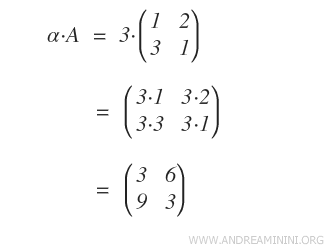Multiplying matrices by scalars
When a matrix B is multiplied by a scalar α, the resulting matrix, denoted B', has each element bij scaled by α, meaning B'ij = α·bij.
$$ \alpha \cdot B = ( \alpha \cdot b_{ij} ) $$
Practical Example: Here, we multiply the scalar α=3 by a matrix A. The result is matrix A, with each element scaled by three.

Properties of Scalar Multiplication
Scalar multiplication of a real number and a matrix follows these properties:
- Distributive Property for Matrix Addition
The product α·(A + B) equals the sum α·A + α·B.Note: Here, A and B are matrices, and α is a real number.
- Distributive Property for Scalar Addition
The product (α+β)·A is equivalent to the sum α·A + β·A. - Associative Property
The product (α·β)·A is equal to α·(β·A). - Multiplicative Identity
Multiplying a matrix by one leaves it unchanged: 1·A = A. Hence, one acts as the multiplicative identity. - Zero Property
Multiplying any matrix by zero results in a zero matrix (0·A = O). - Multiplicative Inverse
The product of -1 and matrix A gives the additive inverse, so (-1)·A = -A.
